Business Planning Report and Market Research: Intercontinental Hotel
VerifiedAdded on 2021/01/02
|9
|2064
|130
Report
AI Summary
This report provides a comprehensive analysis of the Intercontinental Hotel within the contemporary hospitality industry. It begins with an introduction to the industry and the chosen organization, Intercontinental Hotel, a British multinational hospitality company. The report then delves into a PESTLE analysis, assessing the political, economic, social, technological, legislative, and environmental factors impacting the hotel's development, particularly in the UK market. Following this, a SWOT analysis is conducted to evaluate the hotel's strengths, weaknesses, opportunities, and threats, and how this informs the decision-making process. The report further appraises the implications of current and potential trends in the hospitality industry, such as destination promotion, real-time damage control, green practices, last-minute bookings, and technological advancements. The report includes examples of how Intercontinental Hotel is adapting to these trends and evaluates its ability to develop products and services to meet current and future industry demands. Finally, the report concludes by summarizing the key findings and reiterating the importance of adapting to industry trends for success. This report is available on Desklib, a platform offering AI-based study tools.
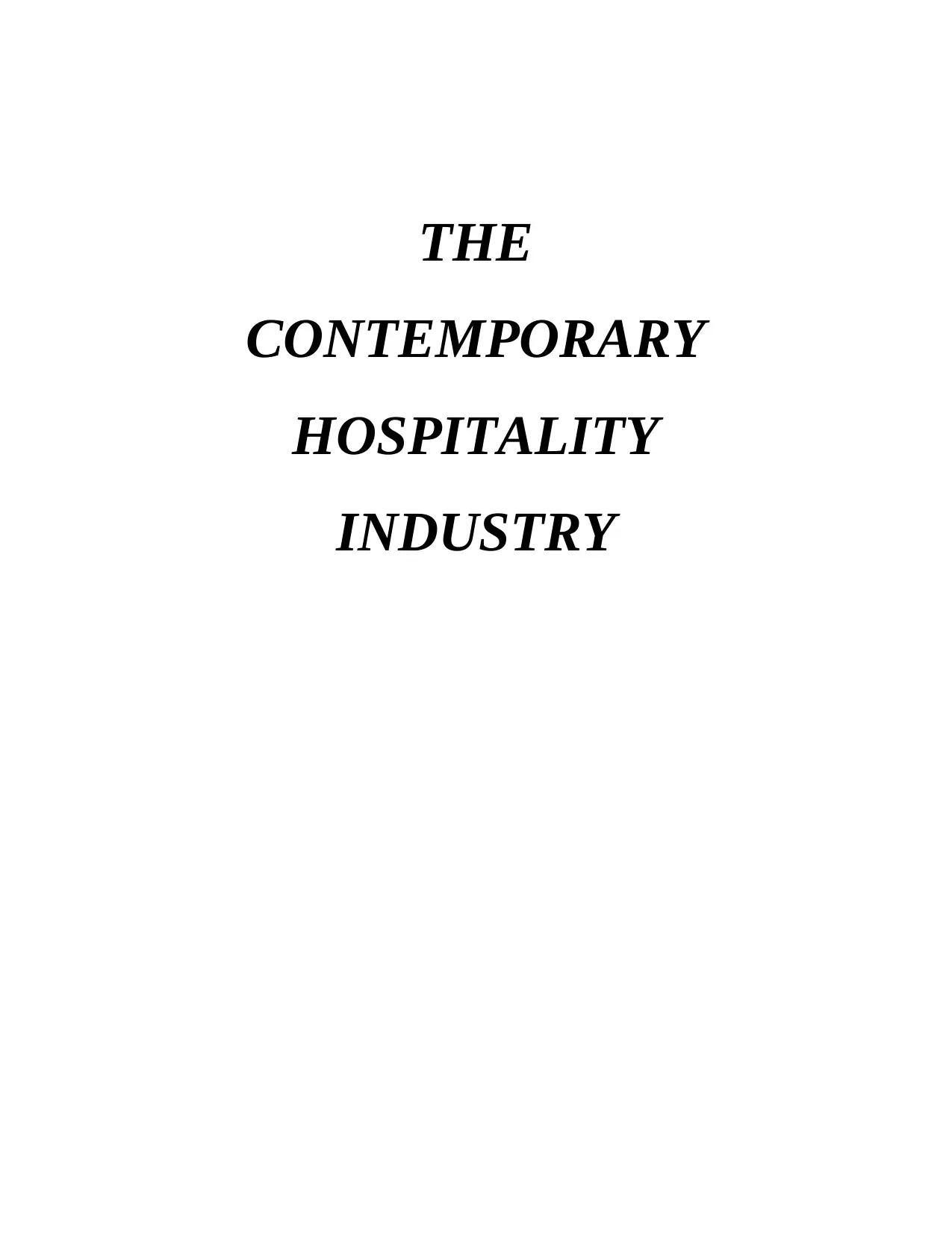
THE
CONTEMPORARY
HOSPITALITY
INDUSTRY
CONTEMPORARY
HOSPITALITY
INDUSTRY
Paraphrase This Document
Need a fresh take? Get an instant paraphrase of this document with our AI Paraphraser
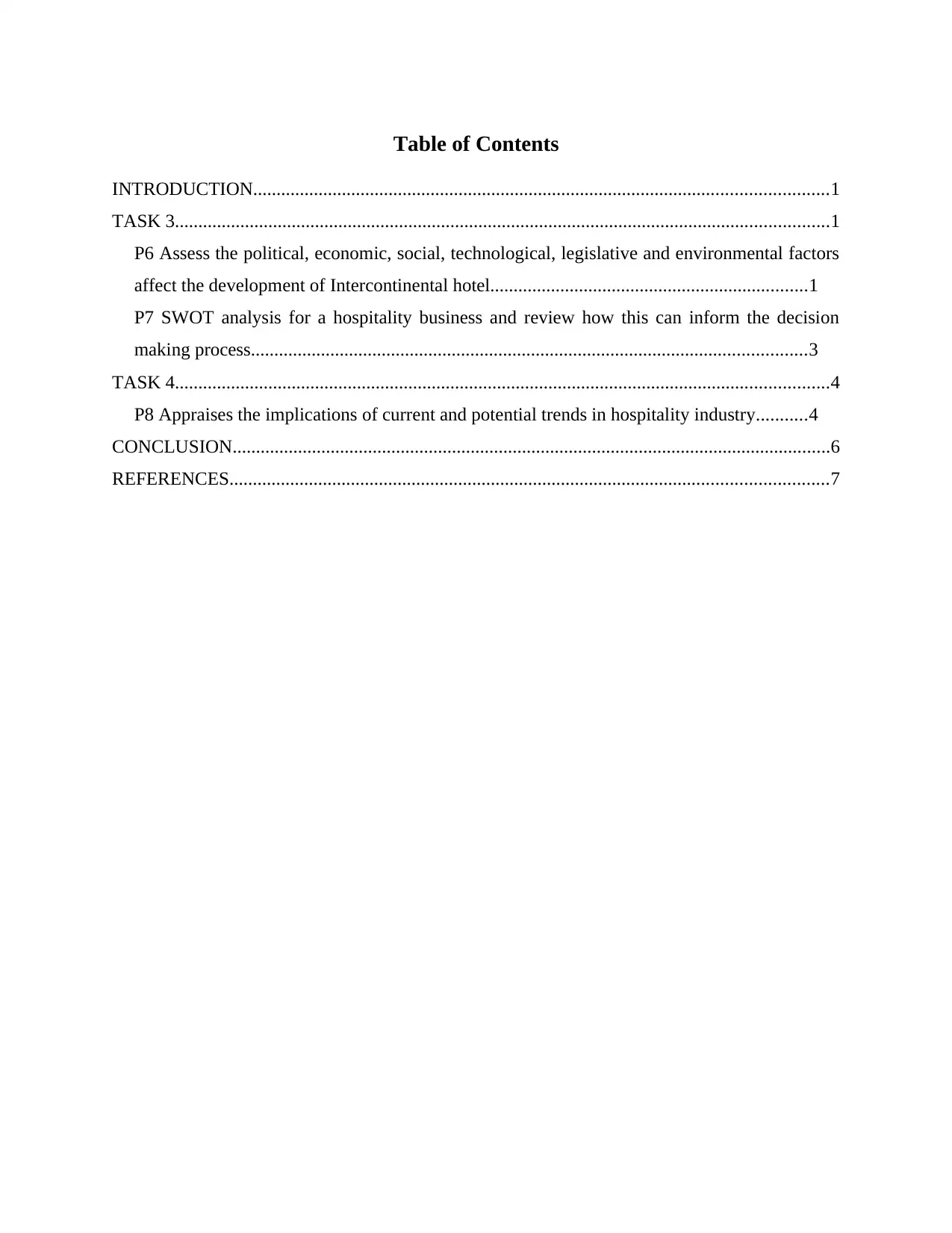
Table of Contents
INTRODUCTION...........................................................................................................................1
TASK 3............................................................................................................................................1
P6 Assess the political, economic, social, technological, legislative and environmental factors
affect the development of Intercontinental hotel....................................................................1
P7 SWOT analysis for a hospitality business and review how this can inform the decision
making process.......................................................................................................................3
TASK 4............................................................................................................................................4
P8 Appraises the implications of current and potential trends in hospitality industry...........4
CONCLUSION................................................................................................................................6
REFERENCES................................................................................................................................7
INTRODUCTION...........................................................................................................................1
TASK 3............................................................................................................................................1
P6 Assess the political, economic, social, technological, legislative and environmental factors
affect the development of Intercontinental hotel....................................................................1
P7 SWOT analysis for a hospitality business and review how this can inform the decision
making process.......................................................................................................................3
TASK 4............................................................................................................................................4
P8 Appraises the implications of current and potential trends in hospitality industry...........4
CONCLUSION................................................................................................................................6
REFERENCES................................................................................................................................7
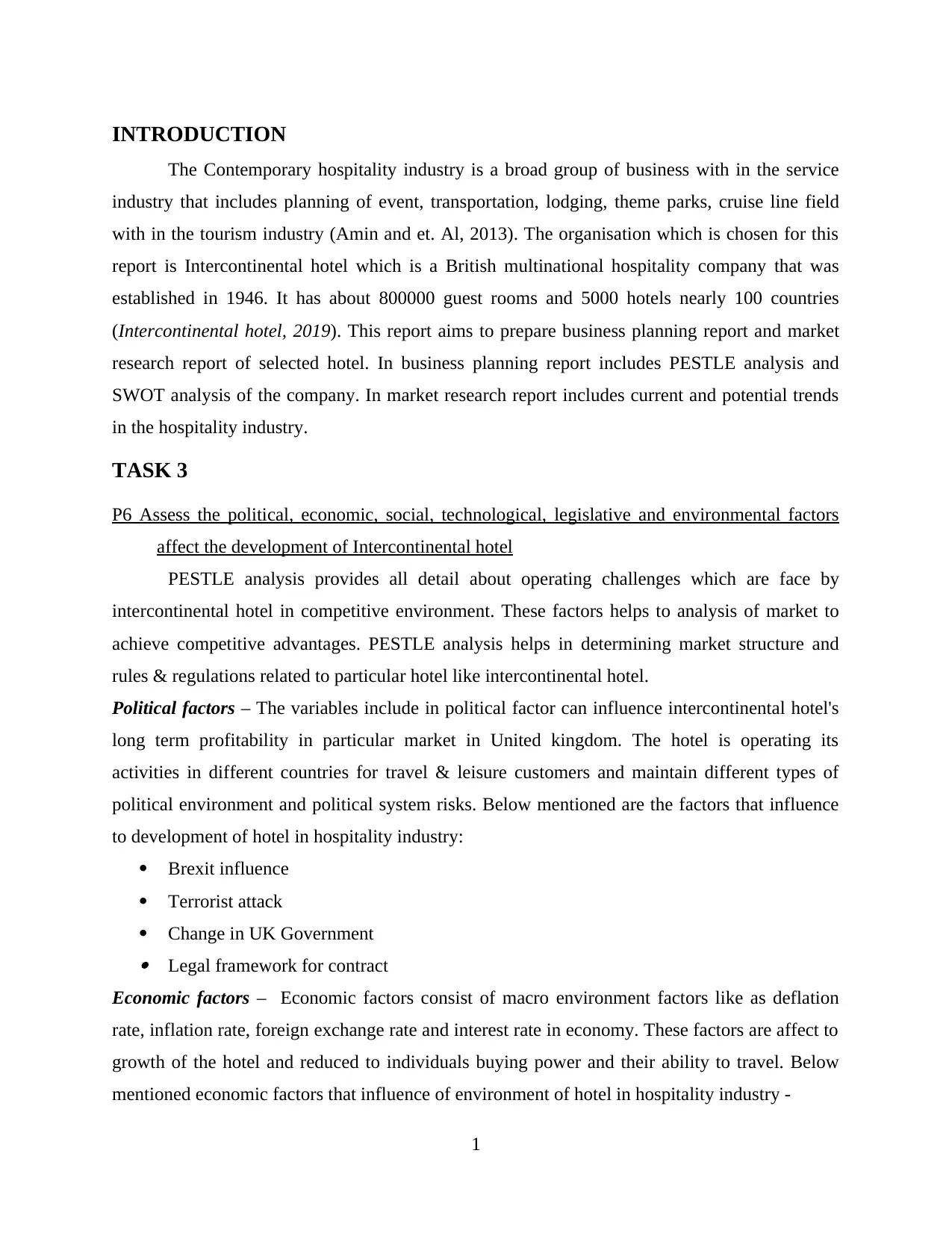
INTRODUCTION
The Contemporary hospitality industry is a broad group of business with in the service
industry that includes planning of event, transportation, lodging, theme parks, cruise line field
with in the tourism industry (Amin and et. Al, 2013). The organisation which is chosen for this
report is Intercontinental hotel which is a British multinational hospitality company that was
established in 1946. It has about 800000 guest rooms and 5000 hotels nearly 100 countries
(Intercontinental hotel, 2019). This report aims to prepare business planning report and market
research report of selected hotel. In business planning report includes PESTLE analysis and
SWOT analysis of the company. In market research report includes current and potential trends
in the hospitality industry.
TASK 3
P6 Assess the political, economic, social, technological, legislative and environmental factors
affect the development of Intercontinental hotel
PESTLE analysis provides all detail about operating challenges which are face by
intercontinental hotel in competitive environment. These factors helps to analysis of market to
achieve competitive advantages. PESTLE analysis helps in determining market structure and
rules & regulations related to particular hotel like intercontinental hotel.
Political factors – The variables include in political factor can influence intercontinental hotel's
long term profitability in particular market in United kingdom. The hotel is operating its
activities in different countries for travel & leisure customers and maintain different types of
political environment and political system risks. Below mentioned are the factors that influence
to development of hotel in hospitality industry:
Brexit influence
Terrorist attack
Change in UK Government Legal framework for contract
Economic factors – Economic factors consist of macro environment factors like as deflation
rate, inflation rate, foreign exchange rate and interest rate in economy. These factors are affect to
growth of the hotel and reduced to individuals buying power and their ability to travel. Below
mentioned economic factors that influence of environment of hotel in hospitality industry -
1
The Contemporary hospitality industry is a broad group of business with in the service
industry that includes planning of event, transportation, lodging, theme parks, cruise line field
with in the tourism industry (Amin and et. Al, 2013). The organisation which is chosen for this
report is Intercontinental hotel which is a British multinational hospitality company that was
established in 1946. It has about 800000 guest rooms and 5000 hotels nearly 100 countries
(Intercontinental hotel, 2019). This report aims to prepare business planning report and market
research report of selected hotel. In business planning report includes PESTLE analysis and
SWOT analysis of the company. In market research report includes current and potential trends
in the hospitality industry.
TASK 3
P6 Assess the political, economic, social, technological, legislative and environmental factors
affect the development of Intercontinental hotel
PESTLE analysis provides all detail about operating challenges which are face by
intercontinental hotel in competitive environment. These factors helps to analysis of market to
achieve competitive advantages. PESTLE analysis helps in determining market structure and
rules & regulations related to particular hotel like intercontinental hotel.
Political factors – The variables include in political factor can influence intercontinental hotel's
long term profitability in particular market in United kingdom. The hotel is operating its
activities in different countries for travel & leisure customers and maintain different types of
political environment and political system risks. Below mentioned are the factors that influence
to development of hotel in hospitality industry:
Brexit influence
Terrorist attack
Change in UK Government Legal framework for contract
Economic factors – Economic factors consist of macro environment factors like as deflation
rate, inflation rate, foreign exchange rate and interest rate in economy. These factors are affect to
growth of the hotel and reduced to individuals buying power and their ability to travel. Below
mentioned economic factors that influence of environment of hotel in hospitality industry -
1
⊘ This is a preview!⊘
Do you want full access?
Subscribe today to unlock all pages.

Trusted by 1+ million students worldwide
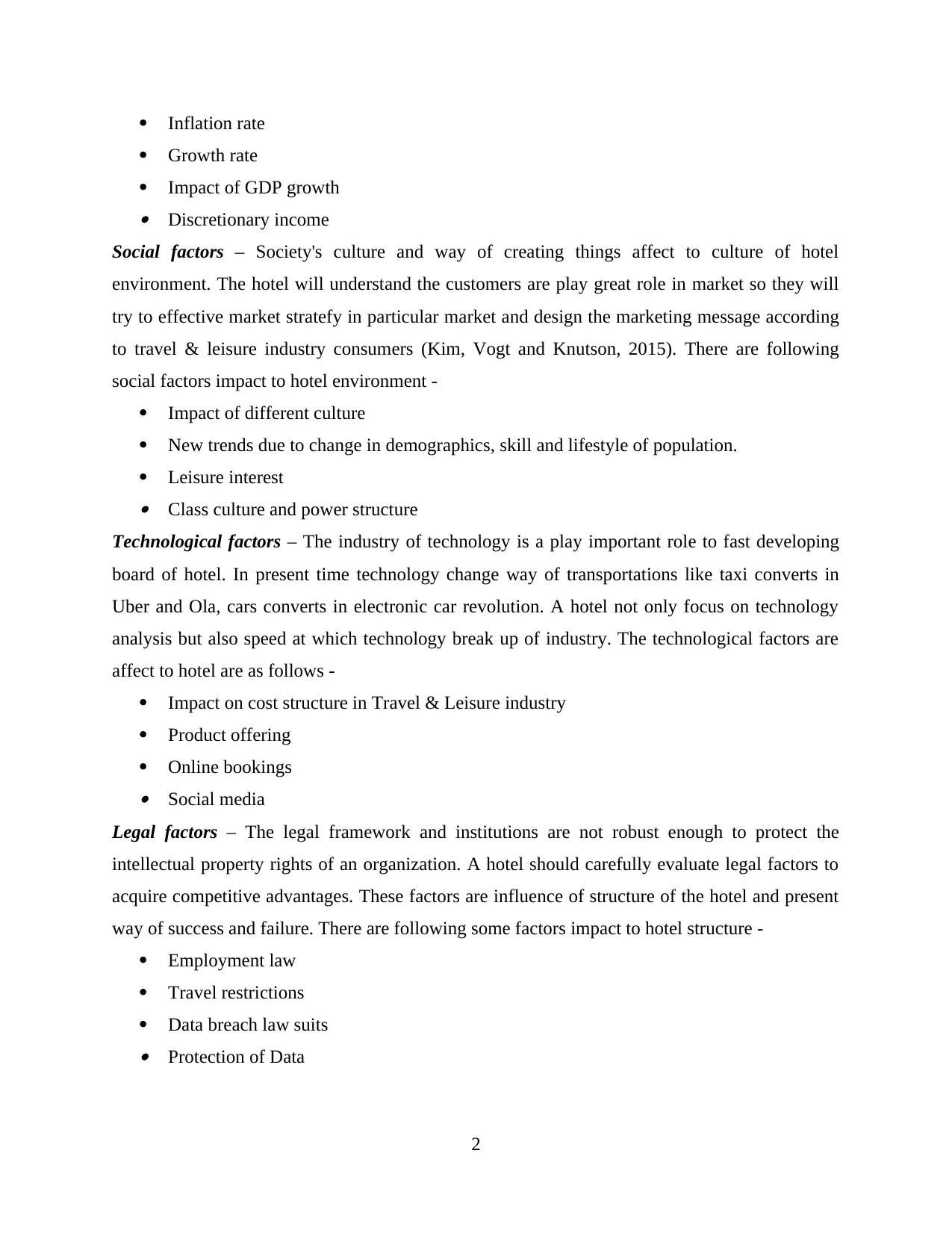
Inflation rate
Growth rate
Impact of GDP growth Discretionary income
Social factors – Society's culture and way of creating things affect to culture of hotel
environment. The hotel will understand the customers are play great role in market so they will
try to effective market stratefy in particular market and design the marketing message according
to travel & leisure industry consumers (Kim, Vogt and Knutson, 2015). There are following
social factors impact to hotel environment -
Impact of different culture
New trends due to change in demographics, skill and lifestyle of population.
Leisure interest Class culture and power structure
Technological factors – The industry of technology is a play important role to fast developing
board of hotel. In present time technology change way of transportations like taxi converts in
Uber and Ola, cars converts in electronic car revolution. A hotel not only focus on technology
analysis but also speed at which technology break up of industry. The technological factors are
affect to hotel are as follows -
Impact on cost structure in Travel & Leisure industry
Product offering
Online bookings Social media
Legal factors – The legal framework and institutions are not robust enough to protect the
intellectual property rights of an organization. A hotel should carefully evaluate legal factors to
acquire competitive advantages. These factors are influence of structure of the hotel and present
way of success and failure. There are following some factors impact to hotel structure -
Employment law
Travel restrictions
Data breach law suits Protection of Data
2
Growth rate
Impact of GDP growth Discretionary income
Social factors – Society's culture and way of creating things affect to culture of hotel
environment. The hotel will understand the customers are play great role in market so they will
try to effective market stratefy in particular market and design the marketing message according
to travel & leisure industry consumers (Kim, Vogt and Knutson, 2015). There are following
social factors impact to hotel environment -
Impact of different culture
New trends due to change in demographics, skill and lifestyle of population.
Leisure interest Class culture and power structure
Technological factors – The industry of technology is a play important role to fast developing
board of hotel. In present time technology change way of transportations like taxi converts in
Uber and Ola, cars converts in electronic car revolution. A hotel not only focus on technology
analysis but also speed at which technology break up of industry. The technological factors are
affect to hotel are as follows -
Impact on cost structure in Travel & Leisure industry
Product offering
Online bookings Social media
Legal factors – The legal framework and institutions are not robust enough to protect the
intellectual property rights of an organization. A hotel should carefully evaluate legal factors to
acquire competitive advantages. These factors are influence of structure of the hotel and present
way of success and failure. There are following some factors impact to hotel structure -
Employment law
Travel restrictions
Data breach law suits Protection of Data
2
Paraphrase This Document
Need a fresh take? Get an instant paraphrase of this document with our AI Paraphraser
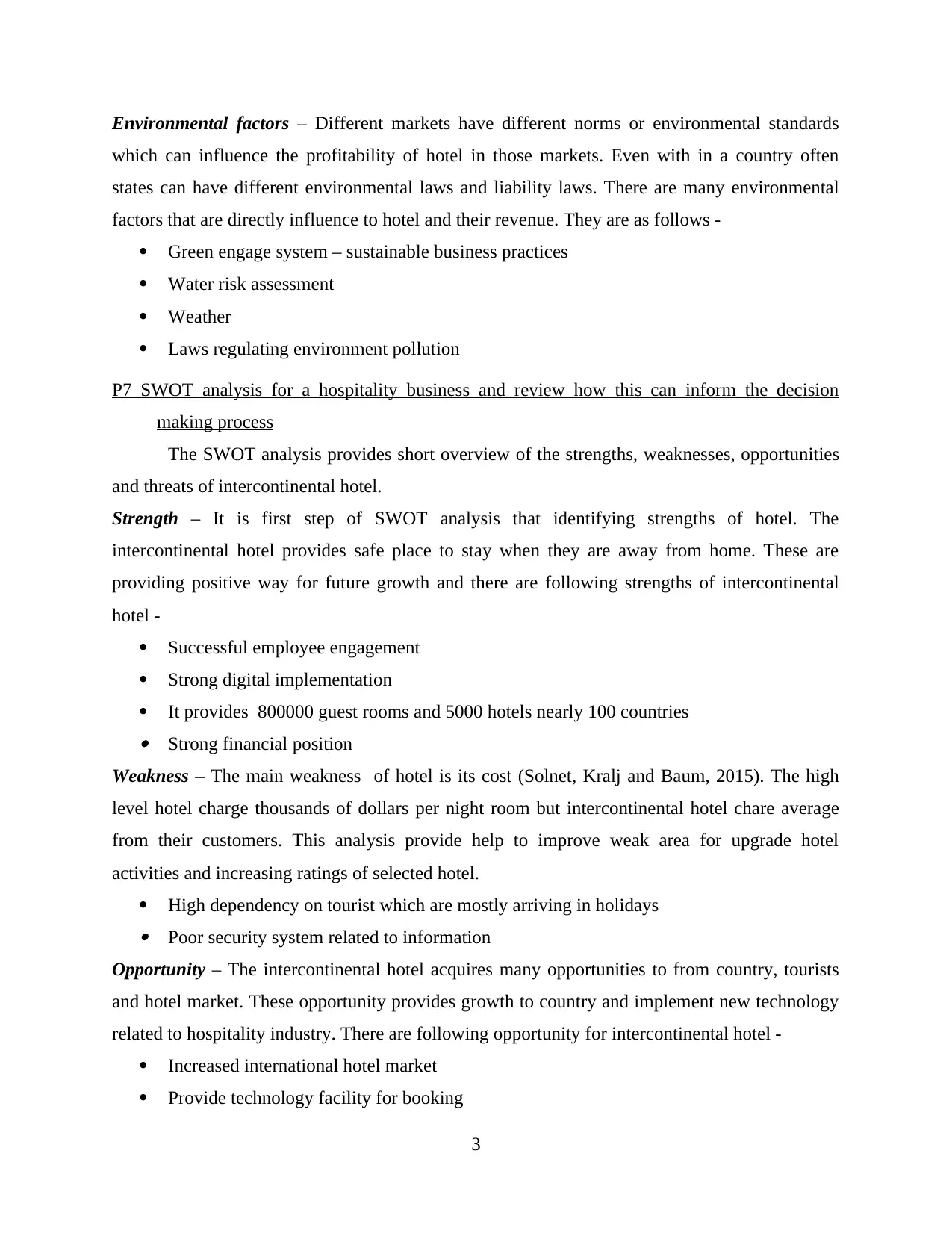
Environmental factors – Different markets have different norms or environmental standards
which can influence the profitability of hotel in those markets. Even with in a country often
states can have different environmental laws and liability laws. There are many environmental
factors that are directly influence to hotel and their revenue. They are as follows -
Green engage system – sustainable business practices
Water risk assessment
Weather
Laws regulating environment pollution
P7 SWOT analysis for a hospitality business and review how this can inform the decision
making process
The SWOT analysis provides short overview of the strengths, weaknesses, opportunities
and threats of intercontinental hotel.
Strength – It is first step of SWOT analysis that identifying strengths of hotel. The
intercontinental hotel provides safe place to stay when they are away from home. These are
providing positive way for future growth and there are following strengths of intercontinental
hotel -
Successful employee engagement
Strong digital implementation
It provides 800000 guest rooms and 5000 hotels nearly 100 countries Strong financial position
Weakness – The main weakness of hotel is its cost (Solnet, Kralj and Baum, 2015). The high
level hotel charge thousands of dollars per night room but intercontinental hotel chare average
from their customers. This analysis provide help to improve weak area for upgrade hotel
activities and increasing ratings of selected hotel.
High dependency on tourist which are mostly arriving in holidays Poor security system related to information
Opportunity – The intercontinental hotel acquires many opportunities to from country, tourists
and hotel market. These opportunity provides growth to country and implement new technology
related to hospitality industry. There are following opportunity for intercontinental hotel -
Increased international hotel market
Provide technology facility for booking
3
which can influence the profitability of hotel in those markets. Even with in a country often
states can have different environmental laws and liability laws. There are many environmental
factors that are directly influence to hotel and their revenue. They are as follows -
Green engage system – sustainable business practices
Water risk assessment
Weather
Laws regulating environment pollution
P7 SWOT analysis for a hospitality business and review how this can inform the decision
making process
The SWOT analysis provides short overview of the strengths, weaknesses, opportunities
and threats of intercontinental hotel.
Strength – It is first step of SWOT analysis that identifying strengths of hotel. The
intercontinental hotel provides safe place to stay when they are away from home. These are
providing positive way for future growth and there are following strengths of intercontinental
hotel -
Successful employee engagement
Strong digital implementation
It provides 800000 guest rooms and 5000 hotels nearly 100 countries Strong financial position
Weakness – The main weakness of hotel is its cost (Solnet, Kralj and Baum, 2015). The high
level hotel charge thousands of dollars per night room but intercontinental hotel chare average
from their customers. This analysis provide help to improve weak area for upgrade hotel
activities and increasing ratings of selected hotel.
High dependency on tourist which are mostly arriving in holidays Poor security system related to information
Opportunity – The intercontinental hotel acquires many opportunities to from country, tourists
and hotel market. These opportunity provides growth to country and implement new technology
related to hospitality industry. There are following opportunity for intercontinental hotel -
Increased international hotel market
Provide technology facility for booking
3
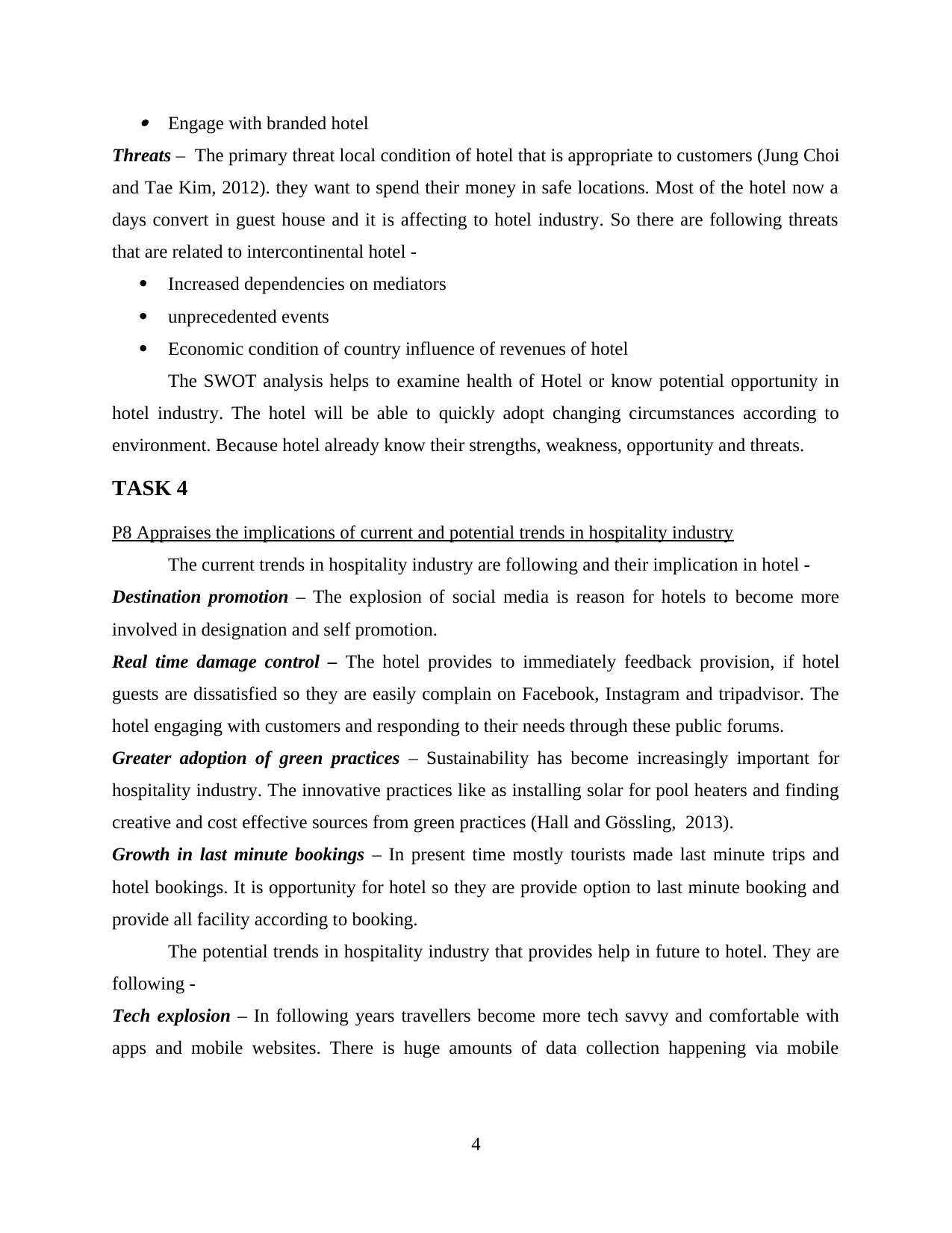
Engage with branded hotel
Threats – The primary threat local condition of hotel that is appropriate to customers (Jung Choi
and Tae Kim, 2012). they want to spend their money in safe locations. Most of the hotel now a
days convert in guest house and it is affecting to hotel industry. So there are following threats
that are related to intercontinental hotel -
Increased dependencies on mediators
unprecedented events
Economic condition of country influence of revenues of hotel
The SWOT analysis helps to examine health of Hotel or know potential opportunity in
hotel industry. The hotel will be able to quickly adopt changing circumstances according to
environment. Because hotel already know their strengths, weakness, opportunity and threats.
TASK 4
P8 Appraises the implications of current and potential trends in hospitality industry
The current trends in hospitality industry are following and their implication in hotel -
Destination promotion – The explosion of social media is reason for hotels to become more
involved in designation and self promotion.
Real time damage control – The hotel provides to immediately feedback provision, if hotel
guests are dissatisfied so they are easily complain on Facebook, Instagram and tripadvisor. The
hotel engaging with customers and responding to their needs through these public forums.
Greater adoption of green practices – Sustainability has become increasingly important for
hospitality industry. The innovative practices like as installing solar for pool heaters and finding
creative and cost effective sources from green practices (Hall and Gössling, 2013).
Growth in last minute bookings – In present time mostly tourists made last minute trips and
hotel bookings. It is opportunity for hotel so they are provide option to last minute booking and
provide all facility according to booking.
The potential trends in hospitality industry that provides help in future to hotel. They are
following -
Tech explosion – In following years travellers become more tech savvy and comfortable with
apps and mobile websites. There is huge amounts of data collection happening via mobile
4
Threats – The primary threat local condition of hotel that is appropriate to customers (Jung Choi
and Tae Kim, 2012). they want to spend their money in safe locations. Most of the hotel now a
days convert in guest house and it is affecting to hotel industry. So there are following threats
that are related to intercontinental hotel -
Increased dependencies on mediators
unprecedented events
Economic condition of country influence of revenues of hotel
The SWOT analysis helps to examine health of Hotel or know potential opportunity in
hotel industry. The hotel will be able to quickly adopt changing circumstances according to
environment. Because hotel already know their strengths, weakness, opportunity and threats.
TASK 4
P8 Appraises the implications of current and potential trends in hospitality industry
The current trends in hospitality industry are following and their implication in hotel -
Destination promotion – The explosion of social media is reason for hotels to become more
involved in designation and self promotion.
Real time damage control – The hotel provides to immediately feedback provision, if hotel
guests are dissatisfied so they are easily complain on Facebook, Instagram and tripadvisor. The
hotel engaging with customers and responding to their needs through these public forums.
Greater adoption of green practices – Sustainability has become increasingly important for
hospitality industry. The innovative practices like as installing solar for pool heaters and finding
creative and cost effective sources from green practices (Hall and Gössling, 2013).
Growth in last minute bookings – In present time mostly tourists made last minute trips and
hotel bookings. It is opportunity for hotel so they are provide option to last minute booking and
provide all facility according to booking.
The potential trends in hospitality industry that provides help in future to hotel. They are
following -
Tech explosion – In following years travellers become more tech savvy and comfortable with
apps and mobile websites. There is huge amounts of data collection happening via mobile
4
⊘ This is a preview!⊘
Do you want full access?
Subscribe today to unlock all pages.

Trusted by 1+ million students worldwide
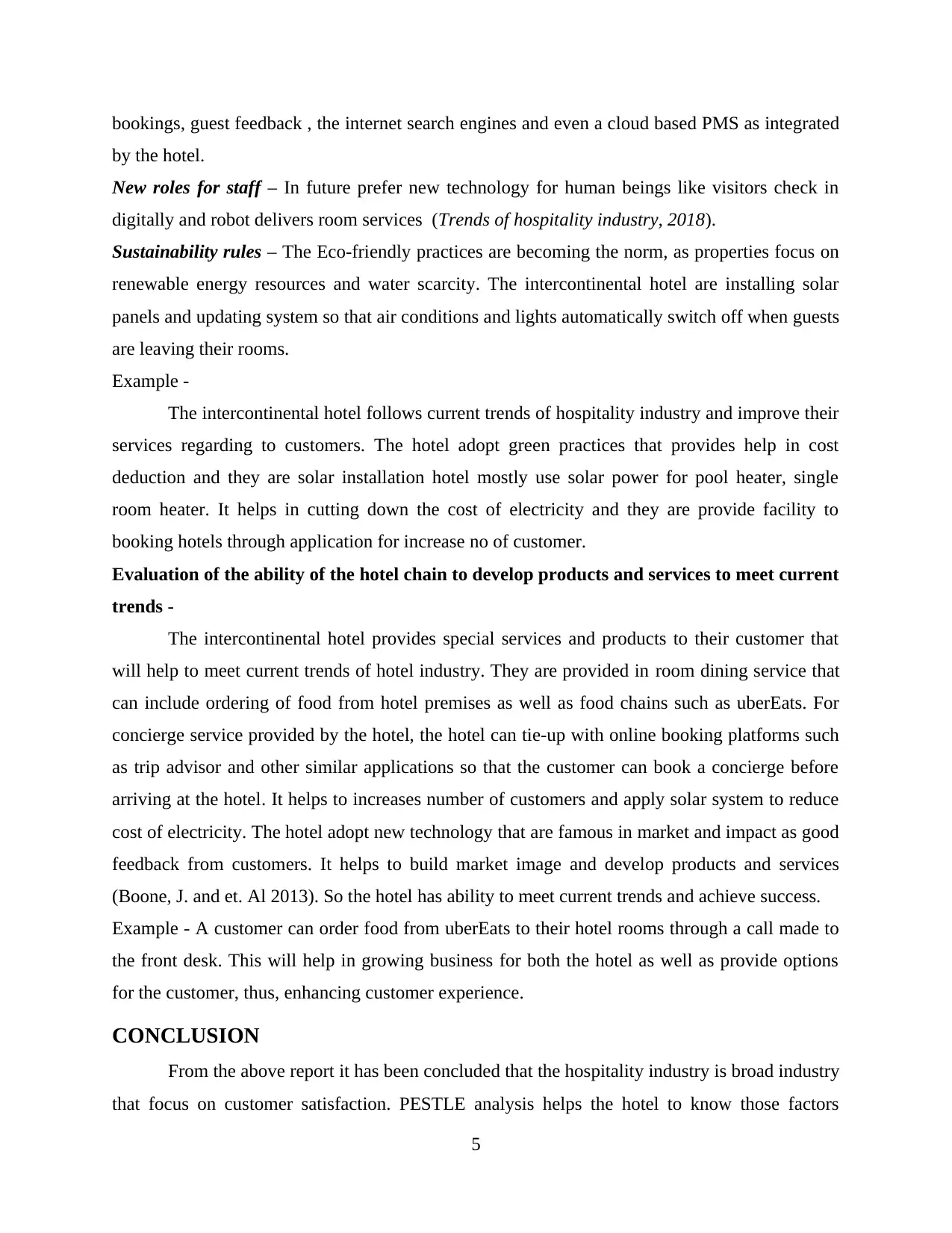
bookings, guest feedback , the internet search engines and even a cloud based PMS as integrated
by the hotel.
New roles for staff – In future prefer new technology for human beings like visitors check in
digitally and robot delivers room services (Trends of hospitality industry, 2018).
Sustainability rules – The Eco-friendly practices are becoming the norm, as properties focus on
renewable energy resources and water scarcity. The intercontinental hotel are installing solar
panels and updating system so that air conditions and lights automatically switch off when guests
are leaving their rooms.
Example -
The intercontinental hotel follows current trends of hospitality industry and improve their
services regarding to customers. The hotel adopt green practices that provides help in cost
deduction and they are solar installation hotel mostly use solar power for pool heater, single
room heater. It helps in cutting down the cost of electricity and they are provide facility to
booking hotels through application for increase no of customer.
Evaluation of the ability of the hotel chain to develop products and services to meet current
trends -
The intercontinental hotel provides special services and products to their customer that
will help to meet current trends of hotel industry. They are provided in room dining service that
can include ordering of food from hotel premises as well as food chains such as uberEats. For
concierge service provided by the hotel, the hotel can tie-up with online booking platforms such
as trip advisor and other similar applications so that the customer can book a concierge before
arriving at the hotel. It helps to increases number of customers and apply solar system to reduce
cost of electricity. The hotel adopt new technology that are famous in market and impact as good
feedback from customers. It helps to build market image and develop products and services
(Boone, J. and et. Al 2013). So the hotel has ability to meet current trends and achieve success.
Example - A customer can order food from uberEats to their hotel rooms through a call made to
the front desk. This will help in growing business for both the hotel as well as provide options
for the customer, thus, enhancing customer experience.
CONCLUSION
From the above report it has been concluded that the hospitality industry is broad industry
that focus on customer satisfaction. PESTLE analysis helps the hotel to know those factors
5
by the hotel.
New roles for staff – In future prefer new technology for human beings like visitors check in
digitally and robot delivers room services (Trends of hospitality industry, 2018).
Sustainability rules – The Eco-friendly practices are becoming the norm, as properties focus on
renewable energy resources and water scarcity. The intercontinental hotel are installing solar
panels and updating system so that air conditions and lights automatically switch off when guests
are leaving their rooms.
Example -
The intercontinental hotel follows current trends of hospitality industry and improve their
services regarding to customers. The hotel adopt green practices that provides help in cost
deduction and they are solar installation hotel mostly use solar power for pool heater, single
room heater. It helps in cutting down the cost of electricity and they are provide facility to
booking hotels through application for increase no of customer.
Evaluation of the ability of the hotel chain to develop products and services to meet current
trends -
The intercontinental hotel provides special services and products to their customer that
will help to meet current trends of hotel industry. They are provided in room dining service that
can include ordering of food from hotel premises as well as food chains such as uberEats. For
concierge service provided by the hotel, the hotel can tie-up with online booking platforms such
as trip advisor and other similar applications so that the customer can book a concierge before
arriving at the hotel. It helps to increases number of customers and apply solar system to reduce
cost of electricity. The hotel adopt new technology that are famous in market and impact as good
feedback from customers. It helps to build market image and develop products and services
(Boone, J. and et. Al 2013). So the hotel has ability to meet current trends and achieve success.
Example - A customer can order food from uberEats to their hotel rooms through a call made to
the front desk. This will help in growing business for both the hotel as well as provide options
for the customer, thus, enhancing customer experience.
CONCLUSION
From the above report it has been concluded that the hospitality industry is broad industry
that focus on customer satisfaction. PESTLE analysis helps the hotel to know those factors
5
Paraphrase This Document
Need a fresh take? Get an instant paraphrase of this document with our AI Paraphraser
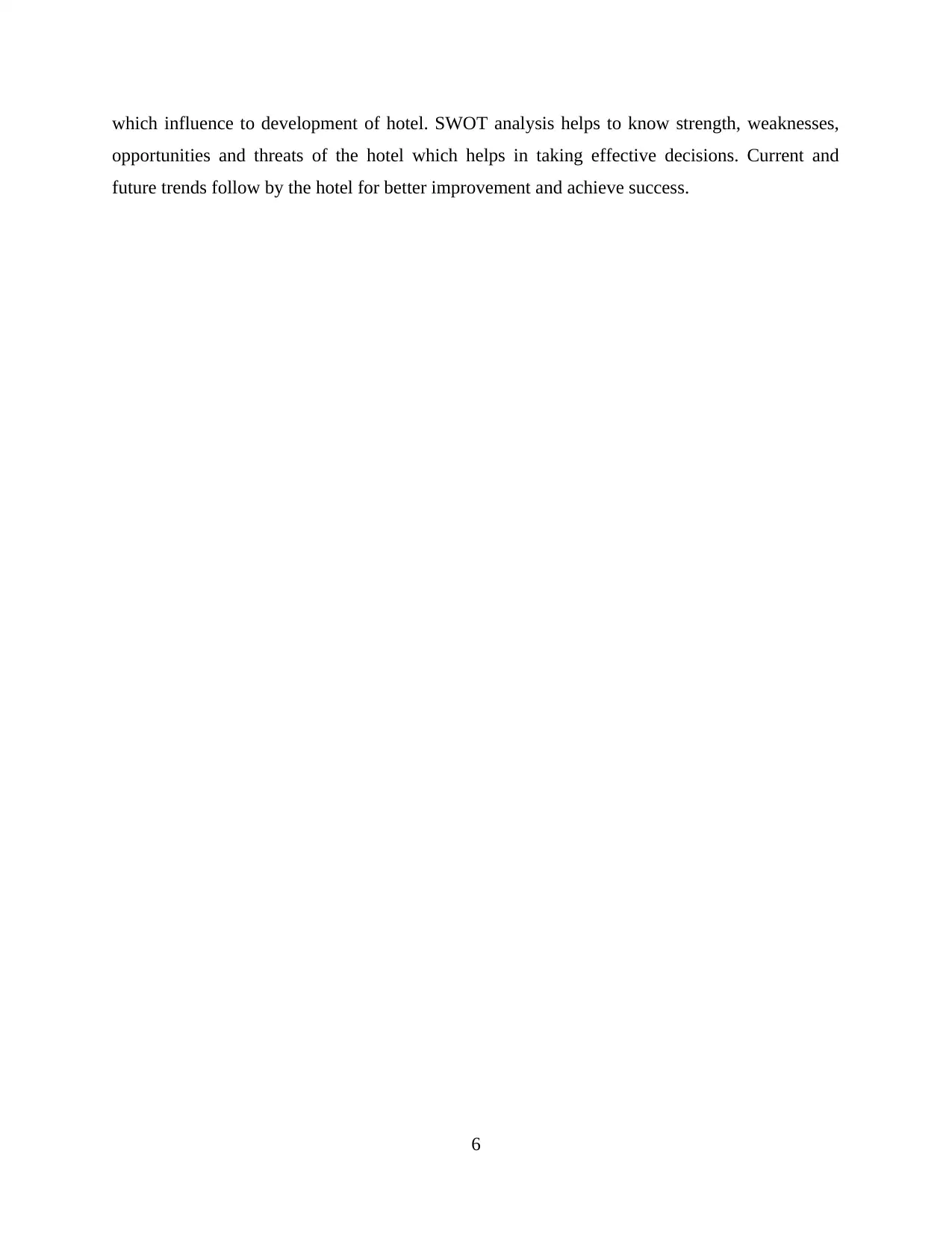
which influence to development of hotel. SWOT analysis helps to know strength, weaknesses,
opportunities and threats of the hotel which helps in taking effective decisions. Current and
future trends follow by the hotel for better improvement and achieve success.
6
opportunities and threats of the hotel which helps in taking effective decisions. Current and
future trends follow by the hotel for better improvement and achieve success.
6
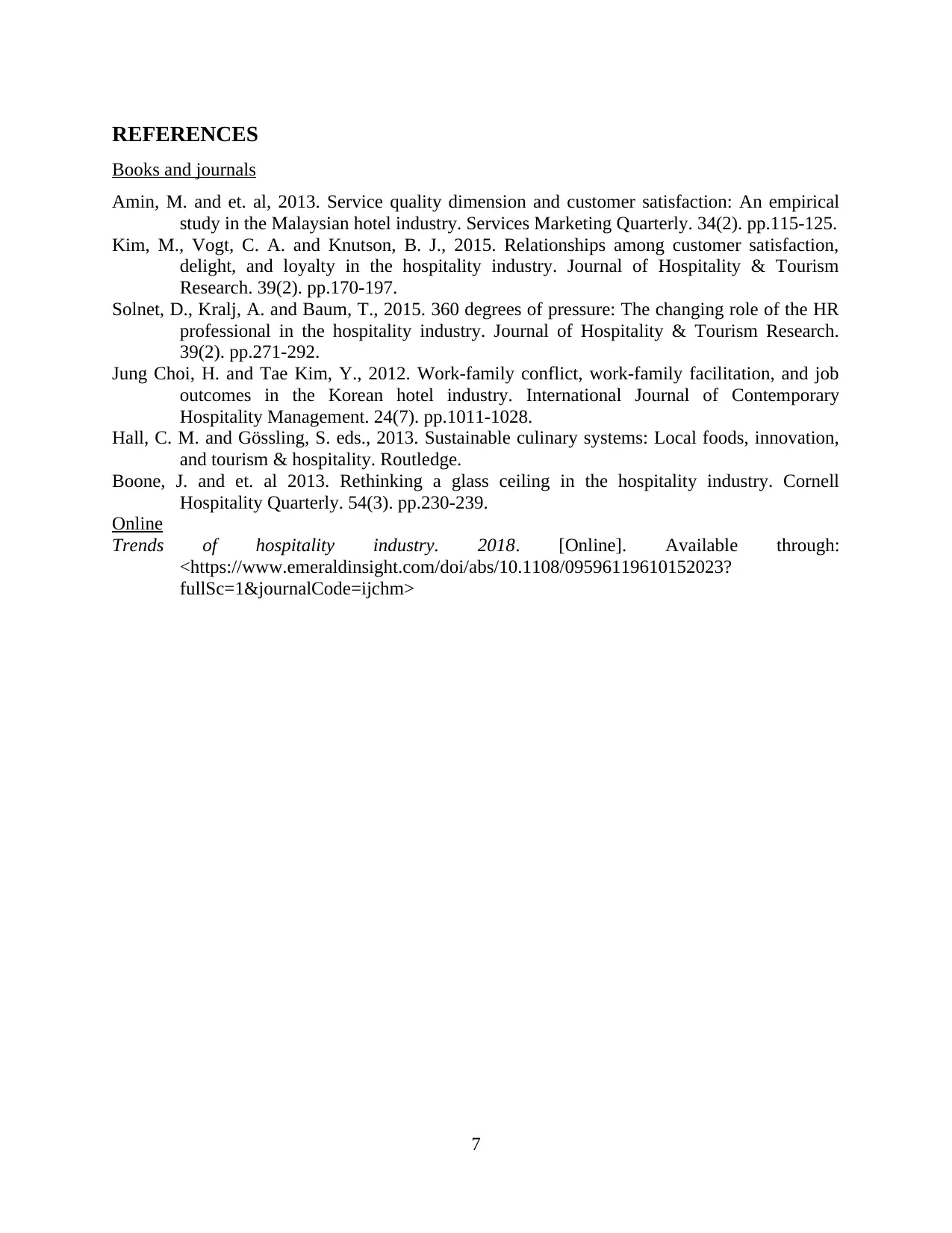
REFERENCES
Books and journals
Amin, M. and et. al, 2013. Service quality dimension and customer satisfaction: An empirical
study in the Malaysian hotel industry. Services Marketing Quarterly. 34(2). pp.115-125.
Kim, M., Vogt, C. A. and Knutson, B. J., 2015. Relationships among customer satisfaction,
delight, and loyalty in the hospitality industry. Journal of Hospitality & Tourism
Research. 39(2). pp.170-197.
Solnet, D., Kralj, A. and Baum, T., 2015. 360 degrees of pressure: The changing role of the HR
professional in the hospitality industry. Journal of Hospitality & Tourism Research.
39(2). pp.271-292.
Jung Choi, H. and Tae Kim, Y., 2012. Work-family conflict, work-family facilitation, and job
outcomes in the Korean hotel industry. International Journal of Contemporary
Hospitality Management. 24(7). pp.1011-1028.
Hall, C. M. and Gössling, S. eds., 2013. Sustainable culinary systems: Local foods, innovation,
and tourism & hospitality. Routledge.
Boone, J. and et. al 2013. Rethinking a glass ceiling in the hospitality industry. Cornell
Hospitality Quarterly. 54(3). pp.230-239.
Online
Trends of hospitality industry. 2018. [Online]. Available through:
<https://www.emeraldinsight.com/doi/abs/10.1108/09596119610152023?
fullSc=1&journalCode=ijchm>
7
Books and journals
Amin, M. and et. al, 2013. Service quality dimension and customer satisfaction: An empirical
study in the Malaysian hotel industry. Services Marketing Quarterly. 34(2). pp.115-125.
Kim, M., Vogt, C. A. and Knutson, B. J., 2015. Relationships among customer satisfaction,
delight, and loyalty in the hospitality industry. Journal of Hospitality & Tourism
Research. 39(2). pp.170-197.
Solnet, D., Kralj, A. and Baum, T., 2015. 360 degrees of pressure: The changing role of the HR
professional in the hospitality industry. Journal of Hospitality & Tourism Research.
39(2). pp.271-292.
Jung Choi, H. and Tae Kim, Y., 2012. Work-family conflict, work-family facilitation, and job
outcomes in the Korean hotel industry. International Journal of Contemporary
Hospitality Management. 24(7). pp.1011-1028.
Hall, C. M. and Gössling, S. eds., 2013. Sustainable culinary systems: Local foods, innovation,
and tourism & hospitality. Routledge.
Boone, J. and et. al 2013. Rethinking a glass ceiling in the hospitality industry. Cornell
Hospitality Quarterly. 54(3). pp.230-239.
Online
Trends of hospitality industry. 2018. [Online]. Available through:
<https://www.emeraldinsight.com/doi/abs/10.1108/09596119610152023?
fullSc=1&journalCode=ijchm>
7
⊘ This is a preview!⊘
Do you want full access?
Subscribe today to unlock all pages.

Trusted by 1+ million students worldwide
1 out of 9
Related Documents
Your All-in-One AI-Powered Toolkit for Academic Success.
+13062052269
info@desklib.com
Available 24*7 on WhatsApp / Email
![[object Object]](/_next/static/media/star-bottom.7253800d.svg)
Unlock your academic potential
Copyright © 2020–2026 A2Z Services. All Rights Reserved. Developed and managed by ZUCOL.





